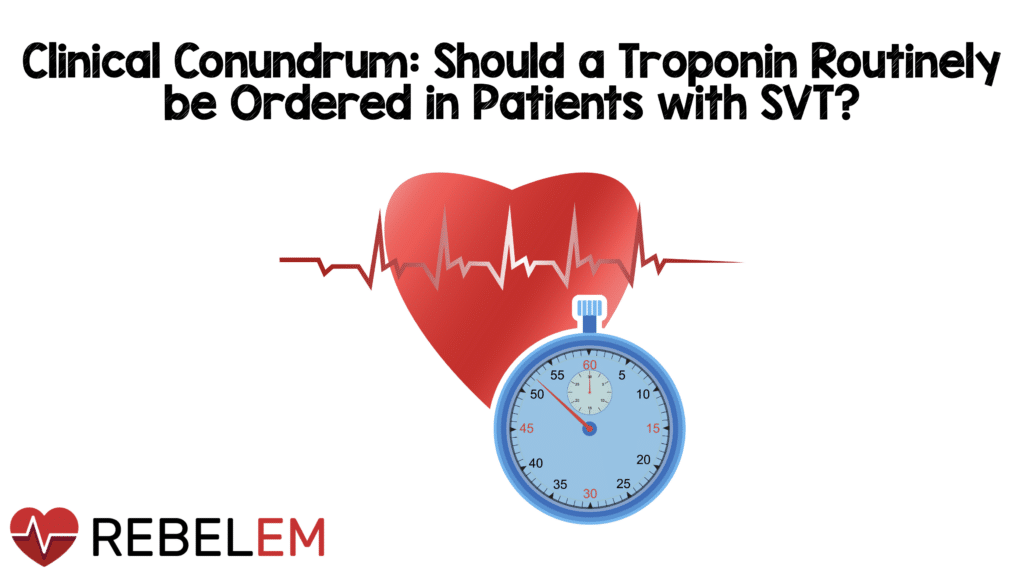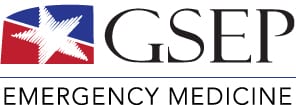
Clinical Scenario: A 44-year-old man presents with palpitations that started 45 minutes ago. He has no medical problems and denies any prior similar symptoms. ECG shows a regular, narrow-complex, tachycardia at 190 bpm consistent with SVT. The patient is hemodynamically stable and you request diltiazem 0.3 mg/kg for cardioversion. After the push, the patient reverts to normal sinus rhythm and is symptom free. The nurse asks if you want to send labs and a troponin.
What Your Gut Says: The patient has a tachydysrhythmia which may be the presentation of acute coronary syndrome (ACS) even though the patient has no ischemic symptoms. Send the troponin just to make sure.
What The Evidence Says:
Gabrielli and colleagues demonstrated that troponin testing in patients with SVT is common. Up to 80% of patients will have at least one troponin sent (Gabrielli 2022). Additionally, they found that up to 30% of the troponins sent are positive. This would seem to argue that troponin testing should be standard practice in those presenting with SVT regardless of symptoms. However, this conclusion confuses the significance of the positive troponin.
A troponin is a protein (not an enzyme) that is detected when there is breakdown of muscle in the body. Troponins are highly specific to cardiac myocytes but do exist in other muscle types as well. In clinical practice, a troponin is used to determine whether a patient has had myocardial damage resulting due to coronary atherosclerosis or an acute coronary occlusion (ACO). This is a Type I myocardial infarction. Essentially, we are using the troponin assay to find patients with ACO who may be benefited by coronary interventions or risk factor modification.
There are other reasons aside from ACO for troponin elevations:
- Type 1: MI due to a spontaneous coronary atherosclerotic event.
- Type 2: MI secondary to ischaemia, but not related to coronary atherosclerosis.
- Type 3: Sudden death with symptoms or signs of ischaemia (not requiring elevated biomarker confirmation).
- Type 4: MI associated with percutaneous coronary intervention (Subtype 4a), or stent thrombosis (Subtype 4b).
- Type 5: MI associated with coronary bypass surgery.
Type 2 MI is common in the ED and can result from vigorous exercise (common in athletes after marathons), sepsis, trauma and tachydysrhythmias including SVT. The available literature shows that SVT is not associated with ACO, Type I MI or serious outcomes either in the short term or after prolonged follow up (Gabrielli 2022). Thus, while we find a large number of positive troponins in patients with SVT, these troponins are false positives for type I MI and can result in prolonged length of stay, higher risk of hospitalization, increased downstream testing and, ultimately, harm (Allen 2021).
Who should have troponins sent? After conversion to sinus rhythm, do a good history, physical and analysis of the ECG. If the patient continues to have symptoms concerning for ACS, troponin testing should be pursued.
Bottom Line: The vast majority of patients presenting with SVT do not need, and should not have, a troponin sent. SVT is not a presenting dysrhythmia consistent w/ ACS. Obtaining a troponin is wasteful and may result in a false positive with additional downstream testing and resultant harms. After cardioversion, if the patient has concerning ischemic symptoms, a troponin can be contemplated but this is an extremely uncommon situation.
Bonus Pearls:
- SVT ECGs will often demonstrate diffuse ST depressions. These depressions (while the patient is in SVT) should not drive troponin testing. Being in SVT is not the equivalent of a stress test (ST depressions here are an electrical phenomena not a reflection of ischemia). Continued ST deviation after conversion should prompt consideration of ACS.
- While adenosine is the most commonly used medication for cardioversion of SVT, calcium channel blockers (ie diltiazem, verapamil) are as effective as adenosine, have a lower rate of SVT recurrence and avoid the sense of dread experienced by patients. Calcium channels blockers should be considered in patients with no history, signs or symptoms of heart failure.
Read More
- EMRAP: Cardiology Corner: Troponins in SVT
- CoreP: Tachydysrhythmias
References
- Gabrielli M et al. Troponin testing in adult patients presenting to the ED for paroxysmal supraventricular tachycardia: a review. Cardiol Rev. 2022. PMID: 35148534
- Allen R, deSouza IS. Troponin testing in patients with supra ventricular tachycardia—are we overcasting? A teachable moment JAMA Int Med. 2021;181(6):842-843. PMID: 33779679
- Foy A, Mandrola J. Updating our thinking on troponin use and interpretation. JAMA Int Med. 2021;181(6):843-844. PMID: 33779692
Post Peer-Reviewed By: Salim R. Rezaie, MD (Twitter/X: @srrezaie)



